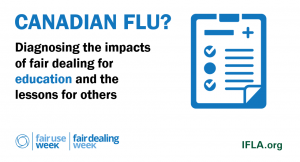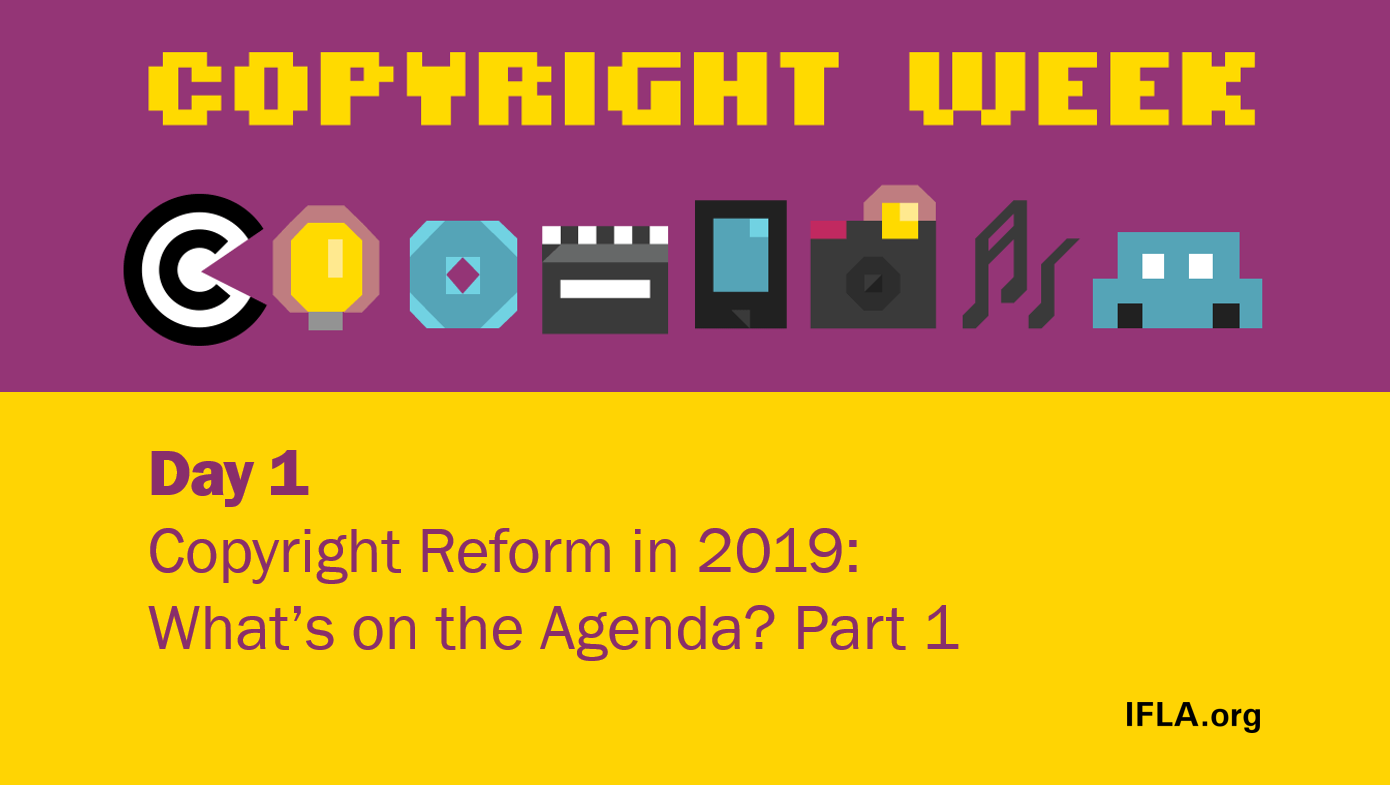Tomorrow, the World Intellectual Property Organization’s Standing Committee on Copyright and Related Rights (SCCR) will hold an information session on the impact of COVID-19 on the cultural and creative industries, on the one hand, and on education and research on the other.
This follows requests from Member States at the previous meeting, conscious of the need to make sense of the experience of actors affected by copyright – either as owners, or as users, of relevant materials. While the meeting formally takes place outside of the SCCR agenda, its place at the beginning of the week will mean that it has the potential to shape discussions over the following days.
To support this, WIPO has published a commissioned study, based both on a series of responses to a call for evidence, and interviews with experts in different countries. The terms of reference for the study have not been shared, but it looks both to tackle the broader question of experiences (as mandated by the last meeting), and to cite case studies of initiatives taken (which goes beyond the mandate).
Ahead of this session – which will be available on WIPO’s webcasting service – this blog looks at some of the questions and issues raised by the report (intentionally or otherwise), and which the meeting tomorrow can hopefully address.
Public spending needed… but on what terms?
A consistent message from the report is the sense that governments need to step in to provide financial and other support, to institutions, businesses and individuals working with copyright where these would otherwise risk disappearing or disengaging. The report underlines in particular that the pandemic has represented a major shock to those actors depending on in-person engagement and activities, such as concerts, author events, or museum visits, as well as events where much business is done, such as book fairs.
Some – but not all – governments have of course taken action to help otherwise viable businesses from failing. The report underlines that more could and should have been done however, with independent authors in a particularly tough situation.
Looking forwards, however, this does raise the question of how to ensure that this support has maximum positive impact. Beyond the preservation of employment, how can this serve to support public interest goals, such as access to education, research and culture?
Digital here to stay, but how?
The report is clear about the fact that the shift to digital is going to be a lasting phenomenon, raising the question of how to ensure the sustainability of digital activities. It underlines components of a response, including efforts to get more people online, training and support for digital maturity, and new policy approaches in general.
A crucial point made is that libraries themselves have invested significantly in digital content – often paying again for the same material that they had already bought in physical format. Clearly, it cannot be sustainable for libraries to pay twice for the same things.
In terms of recommendations, the report does highlight the need to ‘provide clarity to institutions and organizations regarding the copyright implications of moving towards a digital world, and to evaluate appropriate means and innovative ways to make digital uses easier’.
Of course, this could be read either as a case for providing more flexible exceptions and limitations that adapt to needs, or for facilitating licensing. It is to be hoped that COVID will not be used as an excuse to extend the reach of licensing at the expense of the sort of free exceptions that libraries have traditionally relied on extensively, draining their resources.
More worrying is the suggestion that copyright for digital works should be tighter than that for physical ones (i.e. have weaker limitations and exceptions) in order to protect investments. This is to argue that there is less need to protect possibilities for education, research and cultural participation online than in person.
This of course flies in the face of the argument that rights offline should also be protected online, and indeed the case made by the UN Secretary-General that more effort is required to ensure that it is not only the decisions of private companies that should determine what we can and cannot do digitally.
An under-supply of digital content
A persistent issue is the lack of digital content available, especially in developing regions. The report suggests that this is sometimes due to a lack of capacity, but can also be the result of a conscious choice by rightholders not to make works available in digital form, for example due to apparent fears of piracy.
This raises a serious issue about the functioning of markets, and whether it really serves societal interest for works not to be sold in a form that works for people who may not be able to access libraries or bookshops, or even work with physical copies of books. The report suggests more licensing, but this has been a possibility for a long time, and does not seem to have delivered.
Instead, it’s worth remembering that it was the under-supply of accessible format works that underpinned the Marrakesh Treaty, which opened up the possibility to carry out format-shifting of works to make them accessible.
A parallel argument is that the ability of creators themselves to use digital platforms could be a useful area of focus. This is an area where libraries, through providing public access, can indeed help, although to do so need to have the necessary resources to offer such services.
Impacts are varied
At least terms of market impacts on different sectors, the story varies. For example, while extensively citing European research suggesting that the publishing sector there suffered strongly, it notes that publishing in the United States continued to grow. The US of course is characterised by a very flexible copyright regime – fair use – while another country whose model is celebrated, Canada, is also under regular attach from rightholders for the flexibility of their education exceptions.
In addition, the pandemic is reported as having been particularly hard for authors who, in addition to the impacts of falling sales (where sales actually fell), also missed out on other opportunities to earn, such as book fairs and signings. The same goes for performers, and people working as freelancers or on temporary contracts. This does raise questions about terms of employment, and what can be done to ensure fairer distribution of revenues to those missing out.
Anecdotes and rules
A point alluded to in the title is that the focus on examples of initiatives in the report goes beyond what was in the mandate proposed by Member States. This is of course valuable in terms of providing illustrations, but can also lead to the impression that everything is going well.
Furthermore, the report fails to reflect the view of many libraries that these initiatives, while welcome, were often hard to implement and were withdrawn well before the end of the pandemic – see IFLA’s own report on libraries, copyright and COVID-19 for more. Indeed, there is the argument that they were often intended as marketing exercises, aimed at building use of and reliance on services which could then be charged for.
The more systematic examples come the US, where the flexibility provided by fair use is underlined as having enabled initiatives like the Hathi Trust Emergency Temporary Access Service. These arguably provide better pointers for how to build resilience than individual stories that may depend on a wide variety of other factors which are potentially not replicable.
And an old cliché about lending and sales…
The report does touch a number of times on the relationship between library activities and sales. There are unsubstantiated claims about the impact of higher levels of library lending and use. The one reference given is to a speculative conclusion in a German study about future impacts of eLending. This same study also underlines that cutting back on library lending is unlikely to lead to any increase in the purchasing of eBooks.
These arguments also do not sit well with the report’s conclusion that increased spending by libraries on digital content raises sustainability concerns for our institutions. In this case, the question needs rather to be ‘where is the money’?
Going further, unfortunately, it also repeats old tropes implying that the work of libraries is not significantly different to copyright piracy. These betray a fundamental misunderstanding of what copyright is about and how limitations and exceptions work. It also suggests an inability to differentiate between the interests of one particular lobby group, and of society as a whole. It is of course a shame that such claims are repeated in a WIPO-branded report.
Follow the discussion on WIPO’s webcasting service, from 11:30-16:30 Geneva time, for more!
 se Nicholson, BA HDip Libr (UNISA); LLM (WITS) Scholarly Communications Librarian, University of the Witwatersrand, Johannesburg, South Africa
se Nicholson, BA HDip Libr (UNISA); LLM (WITS) Scholarly Communications Librarian, University of the Witwatersrand, Johannesburg, South Africa Debates around fair use and fair dealing are often fierce. For some, they mark a step away from old certainties and bring new and unwanted risks. For others, they are a means of reducing the rigidity of strict, code-based legal systems that risk harming libraries’ ability to serve their users.
Debates around fair use and fair dealing are often fierce. For some, they mark a step away from old certainties and bring new and unwanted risks. For others, they are a means of reducing the rigidity of strict, code-based legal systems that risk harming libraries’ ability to serve their users.